 BACK
to "Beer Reports"
BACK
to "Beer Reports"
 BACK
to "Beer Reports"
BACK
to "Beer Reports"
I know for many of you, that just having a beer is paradise. But the beers I'm talking about are the beers I found in the Polynesian Islands of the South Pacific. Our two month tour took us to 6 countries and 30 islands.
First stop was Tahiti. It was also our shortest, just an hour or so to change planes. Tahiti has it's own brewery producing Hinano, which is available in cans, bottles and draft. Heineken and other international brands were available at the airport.
Our first real stop was Rarotonga in the Cook Islands. It has it's own brewery, which at one time produced most of the beer consumed in the island chain. However, high pressure marketing by the Australian and New Zealand brewers has reduced the brewery to a micro-sized production of only 1,000 liters per week.
|
With the bottling line broken the beer is only available on draught at tourist hotels. We were lucky enough to be given a tour by the reluctant brewmaster, who is the only employee of the brewery housed anonymously in the back of Bonds Liquor Store. No indication of its presence is visible, although four other beer-hounds managed to find out about the tour and accompanied us. The six of us shared a pitcher of Cook's Lager provided at the end of the tour, as well as some cherished labels from the defunct bottling line. This was a bit of an awakening because I had purchased a can of "Raro -- Cook Islands Beer" in another liquor store. Upon closer inspection I discovered the beer had been brewed and canned in New Zealand. |
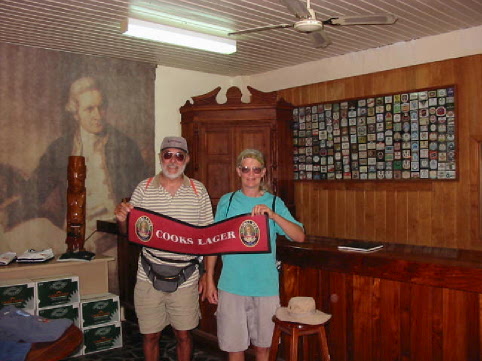
|
Fiji, on the other hand, has two breweries. One I was aware of, it makes Fiji Bitter, Fiji Export and Fiji Gold. All are available in cans and bottles as well as draught. In most of the islands the bottles are reused but no deposit is charge the bottles just seem to find their way back to the breweries. Unless you're on a remote island where the expense of returning them is too much. So the bottles are piled in pyramids waiting for what I'm not sure. When I told someone there was a mountain of beer bottles behind our bure (hut) he thought I had emptied too many myself, until I showed him the proof.
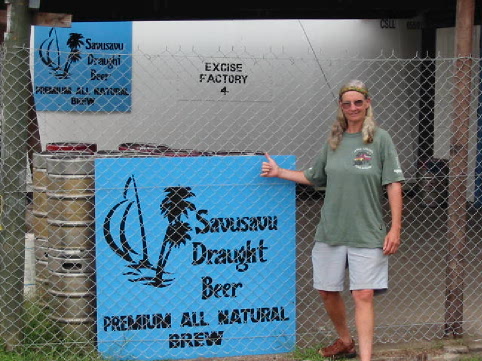
|
Discovering the Savusavu brewery in the port city of the same name was a pleasant surprise. We had no idea it existed until we saw it on tap in our hotel. And even better the brewery was located at the bottom of the hotel driveway (we believe owned by the same people). There was no tour available and the two brewery workers were not very forthcoming. They did tell us that they had been in business for about a year and produced 1500 liters of Savusavu natural beer a week that is only available on draught locally. They were not inclined to give us a sample, so we had to have some back at the hotel. It was drinkable, but suffered from a lack of hops. Besides the sign at the brewery the only advertising we saw was on the tap at the hotel and at the Planters Club. |
|
Tonga has had it's own brewery since 1987. It produces Ikale and Royal in bottles and Royal on draught. Ikale (eagle) is by far the most widely consumed beer on the 171 islands, 50 of which are inhabited. Not all of the bottles in Tonga get back to the brewery. Like all of the Polynesian islands Tonga is very Christian. The missionaries having converted them many years ago. People go to church every day and all day on Sunday. There are no taxis, all the stores are closed and the airline is grounded on the Sabbath. However their burial practices are a very different blend of traditional and Christian ways. People are buried in mounds with banners and flags marking the graves for a 100-day period of mourning. The mounds are of sand that could easily be blown away, so beer bottles are filled with sand and placed around the grave to contain the mound. A very novel recycling method. When I went to the Royal Brewery to take my photo it was difficult to get all of the things I wanted into the cameras lens. So I painstakingly moved a large sign saying "The Taste of Tonga" into position. I made one final adjustment, and then a truck pulled directly in front of the sign. I like the graveyard picture better. |
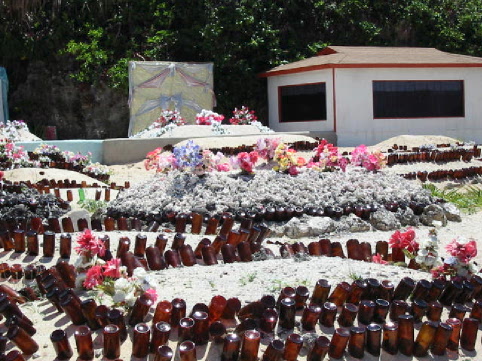

|
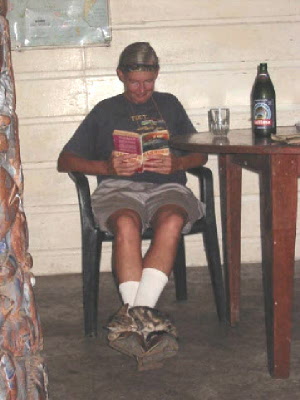
|
Samoa's Vailima Brewery makes beer in 335 and 750-ml bottles as well as draught. It is the beer of the two main islands that make up the country. Vailima means water from the hand and is from an ancient legend of someone carrying water in his hand to save another's life. American Samoa sadly has no brewery. However Vailima Export is available there and not in it's country of origin, so I adopted it as the local beer. Coming in at 6.7% alcohol compared to the domestic versions 4.6% doesn't allow for over consumption, so we drank a lot of Stein Lager, which was the most popular beer in the American possession, despite a clutter of Budweiser and Coors signs. |
|
Niue, yes, it is a country composed of one island, and having only 1700 residents has no brewery. It sells mainly New Zealand brews. I have an idle desire to return and open the world's smallest national brewery. Niue has become the answer to the question we are most commonly asked. "What is your favorite country?" We loved it, being so different from all the other islands we visited. With it's chasms, caves, arches and snorkeling pools, it's like no where else. |
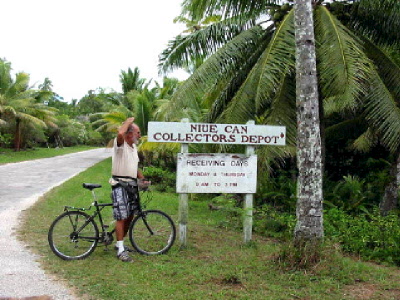
Al wonders what they do about Olde can collectors... |
| Tahiti | Need a can; none available at airport |
| Cooks | Cook Island Beer brewed in N.Z. plus Cooks label. |
| Fiji | Already have a can; a gift from a friend |
| Tonga | Bottle label; I will attach to a can |
| Samoa | ditto |
| American Samoa | Label from Samoan beer |
| Niue | Tui can from N.Z. drank in Niue and it rhymes |
| Panama | Atlas can found on a beach in Tonga. I needed one and this was probably off a yacht. |
I would like a beer can or beer bottle label from the following countries, if you happen to be there: Belize, Switzerland, Romania, Jordan, Malaysia, Indonesia, Cambodia, Malawi, Bahrain, The Bahamas, Jersey (Channel Islands), Guernsey. Please contact me if you can send me one. Many thanks!
Al Strano ©2004 Please